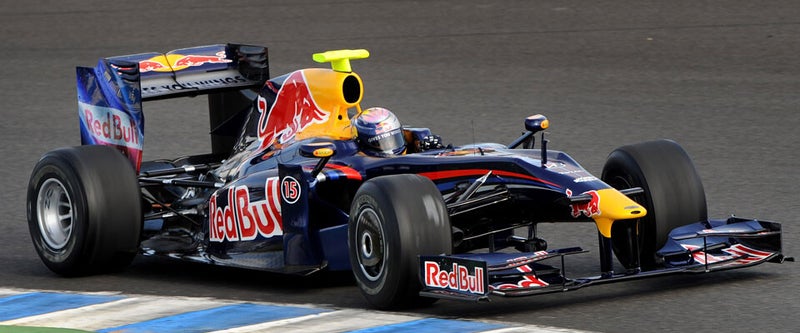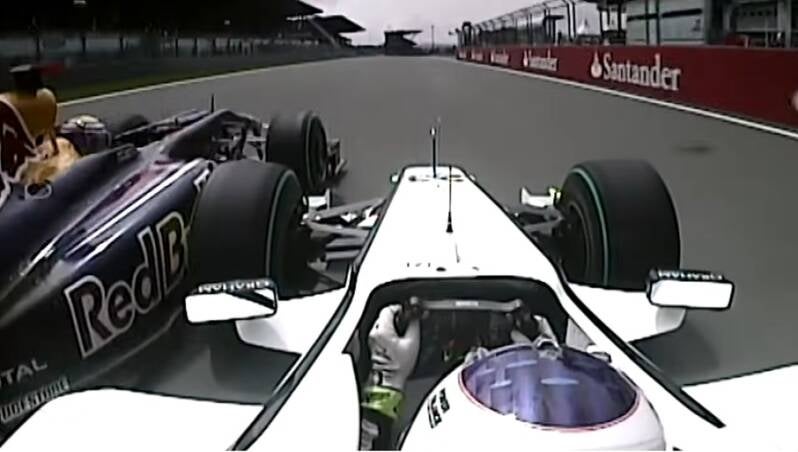Lando Norris is now a Formula 1 race winner, but he is not the only driver who had to wait a long time for their first big hit. F1 history is filled with stories of drivers who had to work really hard for their long awaited first victory. In this episode: Australia’s very own Mark Webber.

Mark Webber wasn’t just a driver who deserved a first win, he was a driver who needed a first win. His career was characterized by a very common pattern: he’d start the season strong, then his form would drop off a little, and by the end of his contract he wouldn’t be sure if he could get a new seat anywhere.
| Mark Webber | |
|---|---|
| Year of first win | 2009 |
| Races before first win | 130 |
| Podiums before first win | 6 |
His very first race in F1 was already one for the ages: he scored points in a car that ran on a budget of whatever the team principal had in his pocket at that moment and whose pace can best be described as “a sleep deprived turtle”. His Minardi just wasn’t quick, but he still managed to score points in his first race. That immediately put him on the map, but his star power diminished a bit after that because he didn’t score any more points in the rest of the season. Not even close. And with Minardi permanently on the verge of bankruptcy, he began looking for a different team. His early season form might have landed him a seat at one of the top teams, but because it fell off later on, he couldn’t get anything better than the midfield team Jaguar.
And from then on it was rinse and repeat. He started strong at Jaguar, scored some critical points, and then his form dropped off so badly that Webber even said he wasn’t sure he’d get a new contract anywhere. He then went to Williams where he scored his first ever podium, and then he hit a slump again. Frank Williams himself told Webber that this form was unacceptable. Over the 2006 season he only scored points in three races all year.
Switch to Red Bull
His final lifeline came from his manager: professional pot-stirrer and recurring F1 villain Flavio Briatore. Briatore had managed to land Webber a seat at the fledgling Red Bull Racing for 2007. At the time this seemed to be a bad move because Red Bull was considered nothing more than a marketing stunt for the energy drinks company. But things finally started to click for Webber. He qualified well, he often scored points despite his car being about as unreliable as possible, and he even scored another podium. Over the course of the 2007 and 2008 season he often did better than his experienced and highly skilled teammate David Coulthard. Webber became a very popular sight in the paddock, known for being a good laugh and an all around nice guy. Things like him injuring himself during a charity event only endeared him more to the fans. His uptick in form made people consider him an underrated driver and now, after seven years, people finally started wondering when he might win his first race.

The RB5 that Webber drove in 2009.
The 2009 German Grand Prix
2009 was a weird season. Brawn GP had come out of nowhere with an absolutely genius car design that left everybody else wondering how the hell they could have missed this. The team was run on a shoestring budget and barely had enough people or funds to keep the team running, but the skills of the upper leadership and drivers Jenson Button and Rubens Barrichello kept the team not only alive, but actually leading in both championships. Titans like Ferrari, Williams and McLaren were nowhere to be found, and former world champions Fernando Alonso, Kimi Raikkonen and Lewis Hamilton were struggling to even get points while the Brawns just calmly drove away. Red Bull was the only team that could somewhat stay on pace with Brawn.
The German Grand Prix was the halfway point of the season. Webber had gotten four more podiums that year, bringing his total to six. He sat in fourth in the championship standings, behind teammate Sebastian Vettel and the two Brawn drivers. Brawn had done incredible so far, winning six out of the first eight races, but the cracks were beginning to show. Button couldn’t manage more than a sixth place in the previous race, which was won by Vettel. Webber managed to qualify on pole position in Germany, the first pole position in his entire career, putting him right ahead of the two Brawns.

Webber and Barrichello colliding on the first lap.
It was an aggressive start from both Webber and Barrichello, going side by side into the first corner. Webber had a, let’s say, “interesting” way of defending. By which I mean he abruptly steered to the side to slam into Barrichello way before they even entered the corner. Both cars survived, though the same cannot be said for the McLaren of Lewis Hamilton. The reigning world champion figured he could benefit from the fight between Webber and Barrichello and he put his car in front of them. He didn’t do it carefully enough though: he cut across Webber too soon and hit the front wing of the Red Bull. This left Webber with front wing damage and Hamilton with a puncture, which meant his race was over.
Now, usually when you have front wing damage, it means your car becomes slower since you can’t really take the turns that well. But apparently nobody told Webber that, because he still kept chasing Barrichello for the lead of the race. They dueled on strategy for when to make their pitstops, which put Webber slightly ahead of his rival. It wouldn’t last long though: Webber soon got a drive-through penalty for his antics on the opening lap, which forced him to go back into the pit again on the next lap.
There was chaos and confusion in the next round of pitstops, but when the dust settled the running order was very clear: Webber in first, Barrichello in second, Vettel in third. Webber began storming away, going more than a second per lap faster than his competitors. Barrichello meanwhile fell into the clutches of Vettel and began losing more and more time, ultimately falling away as his tyres started losing grip to finish a distant fifth. Webber just put in lap after lap, getting cheered on by his father from the pitlane who watched with a mixture of excitement and concern. It had been 130 races since Webber had made his debut in Formula 1 and despite the ups and downs throughout his career it felt like this would finally be the moment where he would join the upper echelon of drivers in the sport. On lap 60, he crossed the finishline and became a race winner in Formula 1.
I know nowadays we’re sick and tired of seeing Red Bulls win races, but this was an incredibly rare sight back in 2009. Webber’s victory was only the third ever race won by a Red Bull. For him it was a moment of pure euphoria. He came onto the radio cheering, his voice raw with emotion as he screamed “YES!!!” thirteen times in a row. Vettel finished in second place and in third came Felipe Massa. It would ultimately be Massa’s final podium of the year as a freak accident in the next race would severely injure him and prevent him from racing for the rest of the year.
Webber called the race “an incredible day”, something that was backed up by Vettel and team principal Christian Horner. Webber would win one more race that year to ultimately end the season in fourth place. He would stay with Red Bull for four more years, playing a critical role in their string of championships during that time, and he would even be in contention for the title himself in 2010.
